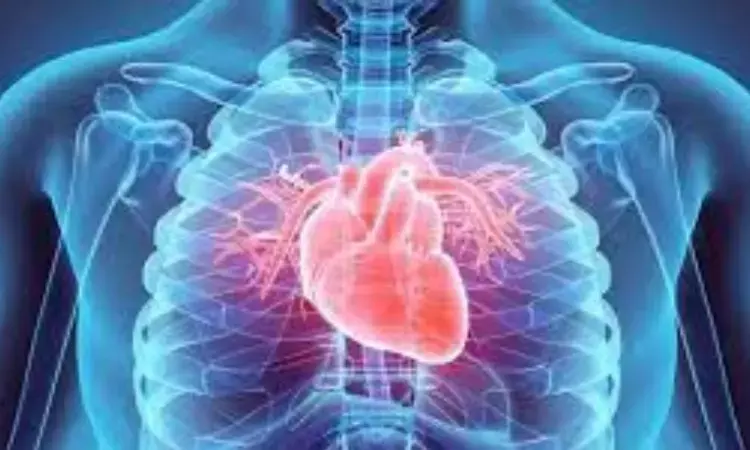- Home
- Medical news & Guidelines
- Anesthesiology
- Cardiology and CTVS
- Critical Care
- Dentistry
- Dermatology
- Diabetes and Endocrinology
- ENT
- Gastroenterology
- Medicine
- Nephrology
- Neurology
- Obstretics-Gynaecology
- Oncology
- Ophthalmology
- Orthopaedics
- Pediatrics-Neonatology
- Psychiatry
- Pulmonology
- Radiology
- Surgery
- Urology
- Laboratory Medicine
- Diet
- Nursing
- Paramedical
- Physiotherapy
- Health news
- Fact Check
- Bone Health Fact Check
- Brain Health Fact Check
- Cancer Related Fact Check
- Child Care Fact Check
- Dental and oral health fact check
- Diabetes and metabolic health fact check
- Diet and Nutrition Fact Check
- Eye and ENT Care Fact Check
- Fitness fact check
- Gut health fact check
- Heart health fact check
- Kidney health fact check
- Medical education fact check
- Men's health fact check
- Respiratory fact check
- Skin and hair care fact check
- Vaccine and Immunization fact check
- Women's health fact check
- AYUSH
- State News
- Andaman and Nicobar Islands
- Andhra Pradesh
- Arunachal Pradesh
- Assam
- Bihar
- Chandigarh
- Chattisgarh
- Dadra and Nagar Haveli
- Daman and Diu
- Delhi
- Goa
- Gujarat
- Haryana
- Himachal Pradesh
- Jammu & Kashmir
- Jharkhand
- Karnataka
- Kerala
- Ladakh
- Lakshadweep
- Madhya Pradesh
- Maharashtra
- Manipur
- Meghalaya
- Mizoram
- Nagaland
- Odisha
- Puducherry
- Punjab
- Rajasthan
- Sikkim
- Tamil Nadu
- Telangana
- Tripura
- Uttar Pradesh
- Uttrakhand
- West Bengal
- Medical Education
- Industry
SGLT2 inhibitor dapagliflozin may prevent cardiovascular complications in type 1 diabetes: Study

Budapest, Hungary: Recent data published in PLOS One supports the preventive and protective role of SGLT2 inhibitors in cardiovascular disease (CVD) associated with type 1 diabetes.
The study provides experimental data for SGLT2i dapagliflozin's (DAPA) cardioprotective effect in T1D. Results showed that DAPA prevents cardiac inflammation, fibrosis, and intimal thickening. This suggests that SGLT2i may provide a novel therapeutic opportunity for hindering the development of CVD in type 1 diabetes, thereby improving the outcomes.
Diabetes patients have a high prevalence of cardiovascular disease which is the leading cause of death in them. Therefore, identifying novel therapeutic strategies that reduce CVD risk is a research priority. Sodium-glucose cotransporter 2 inhibitors (SGLT2i) are a novel class of antidiabetic drugs used mainly in type 2 diabetes mellitus (T2DM). To date, DAPA is the only approved selective SGLT2i in adults with T1DM in the European Union.
Clinical trials have demonstrated that reduction in the relative risk of heart failure by sodium-glucose cotransporter 2 inhibitors (SGLT2i) are partly beyond their glucose-lowering effects however there is still no clarity on the molecular mechanisms. To fill this knowledge gap, Judit Hodrea, Semmelweis University, Budapest, Hungary, and colleagues aimed to investigate the role of dapagliflozin in preventing diabetes-induced cardiovascular complications.
For this purpose, the researchers induced type 1 diabetes in adult, male Wistar rats with streptozotocin (65 mg/bwkg, IP.). Following the diabetes onset, the rates were treated with DAPA (1 mg/bwkg/day, po.) for six weeks.
Based on the study, it was shown that:
- DAPA decreased blood glucose levels (D: 37±2.7 vs. D+DAPA: 18±5.6 mmol/L) and prevented metabolic decline.
- · Aortic intima-media thickening was mitigated by DAPA. DAPA abolished cardiac hypertrophy and myocardial damage.
- · Cardiac inflammation and fibrosis were also moderated after DAPA treatment.
"Our results support the preventive and protective role of SGLT2i in diabetes-associated cardiovascular disease," wrote the authors. "SGLT2i may provide novel therapeutic strategy to hamper CVD development in T1D, thereby improve the outcomes."
Reference:
Hodrea J, Saeed A, Molnar A, Fintha A, Barczi A, Wagner LJ, et al. (2022) SGLT2 inhibitor dapagliflozin prevents atherosclerotic and cardiac complications in experimental type 1 diabetes. PLoS ONE 17(2): e0263285. https://doi.org/10.1371/journal.pone.0263285
Dr Kamal Kant Kohli-MBBS, DTCD- a chest specialist with more than 30 years of practice and a flair for writing clinical articles, Dr Kamal Kant Kohli joined Medical Dialogues as a Chief Editor of Medical News. Besides writing articles, as an editor, he proofreads and verifies all the medical content published on Medical Dialogues including those coming from journals, studies,medical conferences,guidelines etc. Email: drkohli@medicaldialogues.in. Contact no. 011-43720751


